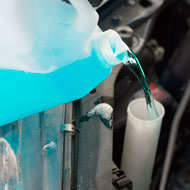Calls to add bitter ingredients to antifreeze

Cats are attracted to the sweet taste of antifreeze, leading to thousands of deaths each year.
Antifreeze manufacturers are being urged to add a bitter-tasting ingredient to their products, in order to prevent thousands of cat deaths every year.
A Yorkshire-based cat charity has joined international calls for change, after one of its rehomed cats was recently poisoned.
Yorkshire Cat Rescue says thousands of cats in the UK die needlessly each year after unwittingly consuming antifreeze, which causes kidney failure.
“It would be so simple for manufacturers to prevent these unnecessary deaths by adding a ‘bitterant’ to their product,” said Sara Atkinson, the charity's founder. “Cats are attracted to the sweet taste of antifreeze which, even when ingested in small doses, is very likely to prove fatal.”
Worse still, many of these are poisoned on purpose, she added.
“We recently received the incredibly sad news that Gizmo, a cat we had rehomed a few years ago, had fallen victim to such an antifreeze attack. It was devastating news. Gizmo was a lovely, incredibly affectionate cat and had settled in fantastically in his new home.”
Worryingly, Gizmo's case is not isolated. Five other cats have also suffered antifreeze poisoning on the same street in Padiham, Lancashire, during just one week in July.
“It is hateful attacks like this which highlight the need for the Government to intervene and help put pressure on antifreeze manufacturers to ensure the safety of our pets,” Sara said.
“Why the manufacturing companies are so dead set against making such a small but important change to their product I simply do not understand.
“They have the power to save the lives of thousands of cats each year and put an end to these senseless and deliberate attacks. Countless families would be spared the heartbreak of losing their much loved pet.”
The prognosis is often very poor for cats who have swallowed antifreeze. Symptoms can include co-ordination problems, vomiting and seizures but by this stage it is usually too late to save the majority from kidney failure.



 The BSAVA has opened submissions for the BSAVA Clinical Research Abstracts 2026.
The BSAVA has opened submissions for the BSAVA Clinical Research Abstracts 2026.